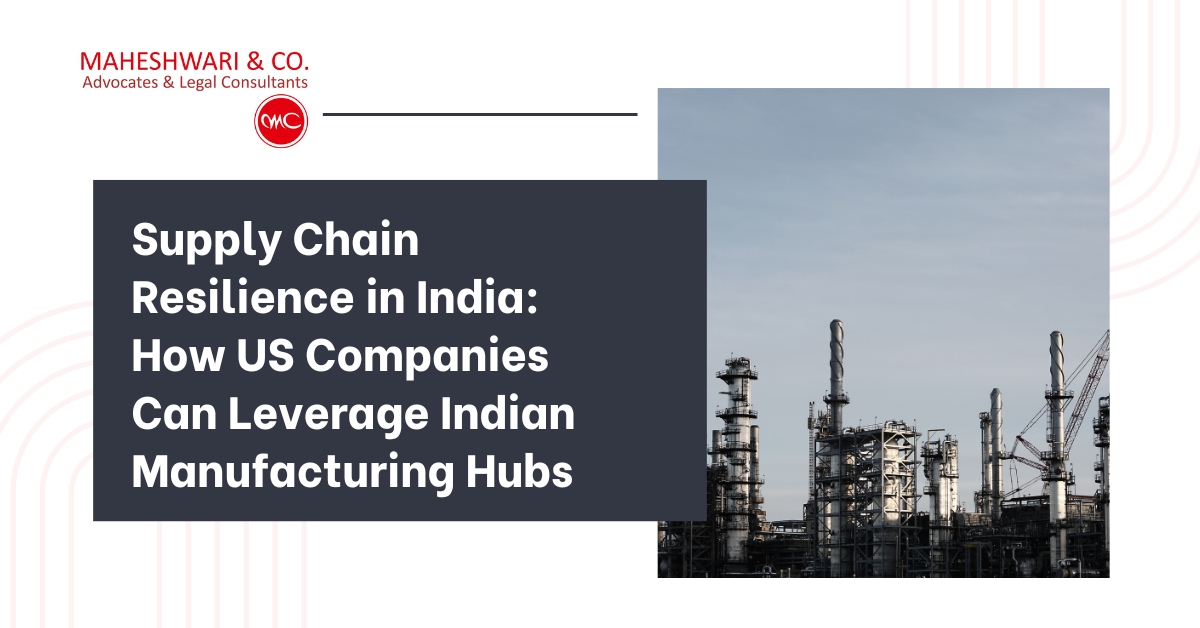In the current global landscape, supply chain resilience in India has become a critical concern for US companies. The disruptions caused by the COVID-19 pandemic, geopolitical tensions, and shifting economic policies have exposed the vulnerabilities of relying heavily on single-source supply chains, particularly those centred in China. This has led many US companies to reconsider their supply chain strategies, seeking to diversify and enhance resilience. One of the most promising solutions lies in leveraging Indian manufacturing hubs.
India presents a compelling case for US companies aiming to bolster their supply chains. With its robust legal framework, India offers a favourable environment for foreign direct investment (FDI). The legal framework for US companies in India is designed to protect foreign investors while ensuring compliance with local laws. This includes regulations related to intellectual property rights, labour laws, and tax incentives, making India a strategic partner for supply chain diversification. Supply chain resilience in India is becoming increasingly important as companies look to mitigate risks.
The Strategic Importance of Supply Chain Resilience in India
Supply chain resilience in India has emerged as a pivotal consideration for US companies due to global disruptions. The strategic importance of resilience in supply chains cannot be overstated, especially when considering the legal implications of supply chain failures. Supply chain diversification is essential in mitigating risks associated with geopolitical tensions, natural disasters and economic instability. By diversifying their supply chains, US companies can safeguard against the legal and financial repercussions of supply chain interruptions.
Companies must consider the ramifications of supply chain disruptions, which can lead to breaches of contract, delays in delivery and potential litigation. US companies are increasingly looking towards Indian manufacturing hubs as a viable alternative to traditional supply chain networks. Supply chain resilience in India is supported by the country’s legal environment, which offers a robust framework for contract enforcement, dispute resolution, and intellectual property protection.
The legal framework for US companies in India is designed to accommodate foreign investments while ensuring compliance with local regulations. This includes provisions for protecting trade secrets, enforcing non-compete agreements and ensuring that contractual obligations are met. Supply chain resilience in India is further strengthened by India’s judiciary, which is well-equipped to handle complex commercial disputes, providing an additional layer of security for US companies.
Why India? An Emerging Manufacturing Hub
Supply chain resilience in India is becoming increasingly associated with India’s rise as a global manufacturing hub. India’s strategic importance lies not only in its vast industrial capabilities but also in its robust legal framework that supports foreign investment and operations. For US companies, understanding why India is an emerging manufacturing hub requires a deep dive into its legal and regulatory landscape, which is designed to attract and protect foreign investors.
Legal Incentives for Manufacturing in India
India offers a range of legal incentives that make it an attractive destination for US companies looking to diversify their supply chains. These incentives include tax breaks, exemptions on import duties for capital goods, and subsidies under some schemes. Supply chain resilience in India benefits from these legal incentives, which ensure that foreign investors can operate with confidence in a legally secure environment.
Moreover, India’s commitment to international trade agreements provides an additional layer of security for US companies. Bilateral treaties and participation in organizations like the World Trade Organization (WTO) help to standardize trade practices and reduce the risks associated with cross-border transactions. This legal infrastructure not only enhances supply chain risk management but also positions India as a reliable partner in the global supply chain network.
Foreign Direct Investment (FDI) Regulations
India has a well-defined set of regulations governing Foreign Direct Investment (FDI). The country allows 100% FDI in most sectors under the automatic route, meaning no prior government approval is required. However, certain sectors such as defence, telecom, and pharmaceuticals may have specific caps or require government approval. Supply chain resilience in India is greatly influenced by understanding these FDI regulations, which is crucial for US companies to ensure compliance and avoid legal complications..
For instance, the Indian government has introduced several reforms to make FDI more attractive, including the relaxation of caps in critical sectors and the simplification of the approval process. Supply chain resilience in India is enhanced by these regulatory reforms, which ensure that US companies operate within the bounds of Indian law, protecting their investments while contributing to supply chain diversification.
Labour Laws and Workforce Regulations
One of the key strengths of Indian manufacturing hubs is the availability of a large, skilled, and cost-effective workforce. However, managing this workforce requires compliance with India’s complex labour laws, which govern everything from wages and working conditions to employee benefits and dispute resolution. Supply chain resilience in India depends on understanding these laws to avoid legal pitfalls and ensure smooth operations.
Compliance with these laws is not only a legal requirement but also a critical component of supply chain diversification strategies, ensuring that operations are not disrupted by labour disputes or regulatory non-compliance.
Intellectual Property Protection
Another significant factor that makes India an emerging manufacturing hub is its robust intellectual property (IP) protection regime. The Indian government has strengthened IP laws to align with international standards, offering strong protection for patents, trademarks and trade secrets. Supply chain resilience in India is supported by this legal framework, which includes mechanisms for the enforcement of IP rights.
The legal framework for US companies in India includes mechanisms for the enforcement of IP rights, such as the ability to obtain injunctions against infringers, seek damages, and pursue criminal actions in cases of piracy or counterfeiting. This level of protection is critical for companies looking to safeguard their innovations and maintain a competitive edge in the market. The ability to protect intellectual property rights effectively is a key component of supply chain risk management.
Environmental and Regulatory Compliance
India’s legal environment also includes stringent regulations related to environmental protection and sustainability. Companies operating in Indian manufacturing hubs must comply with various environmental laws, including the Environment Protection Act, 1986 the Air (Prevention and Control of Pollution) Act, 1987 and the Water (Prevention and Control of Pollution) Act, 1974. These laws require companies to adopt environmentally friendly practices and technologies, thereby contributing to sustainable supply chain operations.
For US companies, ensuring compliance with these regulations is essential not only to avoid legal penalties but also to meet the increasing global demand for sustainable and ethically sourced products. Supply Chain Resilience in India benefits from the alignment of corporate sustainability goals with India’s regulatory requirements, enhancing the resilience and reputation of supply chains.
Conclusion
In conclusion, supply chain resilience in India offers a strategic opportunity for US companies to enhance their global operations by leveraging India’s robust manufacturing hubs. By forming a US-India manufacturing partnership, companies can not only diversify their supply chains but also benefit from India’s favourable legal framework, which supports foreign investment, protects intellectual property, and ensures compliance with international standards. To navigate these opportunities effectively and mitigate potential risks, it is advisable for companies to consult legal professionals with expertise in Indian law and international trade regulations.
Strengthen Your Supply Chain in India with MAHESHWARI & CO.’s Legal Expertise
Our firm specializes in assisting US companies with navigating India’s complex regulatory environment, offering comprehensive legal support in areas such as FDI regulations, intellectual property protection, labour law compliance and environmental standards. With MAHESHWARI & CO. by your side, you can confidently establish and optimize your supply chain operations in India, ensuring resilience, compliance and long-term success.
FAQs on Supply Chain Resilience in India
1. What is supply chain resilience in India, and why is it important for US companies?
Supply chain resilience in India refers to the ability of supply chains to adapt to disruptions, maintain operations, and quickly recover from challenges. For US companies, enhancing supply chain resilience by leveraging India’s manufacturing capabilities is crucial to mitigate risks associated with geopolitical tensions, natural disasters and economic fluctuations. India’s robust legal framework, skilled workforce, and strategic location make it an ideal partner for building resilient supply chains.
2. How can US companies benefit from a US-India manufacturing partnership?
A US-India manufacturing partnership offers several benefits, including access to a large and cost-effective workforce, government incentives, and a stable legal environment. Supply chain resilience in India can be significantly enhanced through this partnership, allowing US companies to diversify their supply chains, reduce dependency on single-source suppliers, and tap into India’s growing industrial base.
3. What role does Supply Chain Risk Management play in leveraging Indian manufacturing hubs?
Supply Chain Risk Management is critical when integrating Indian manufacturing hubs into a global supply chain. It involves identifying, assessing and mitigating risks such as political instability, legal compliance issues and supply disruptions. US companies must develop comprehensive risk management strategies that include legal safeguards, diversified sourcing and the use of technology to monitor and respond to risks in real-time. This approach ensures that operations remain stable and resilient against potential challenges.
4. How does India’s legal framework support supply chain resilience in India for US companies?
India’s legal framework plays a significant role in supporting supply chain resilience in India by offering robust protections for foreign investments, enforcing contracts and safeguarding intellectual property rights. The country’s participation in international trade agreements and its comprehensive regulatory environment ensure that US companies can operate securely and efficiently within Indian manufacturing hubs. These legal protections help mitigate risks and enhance the overall resilience of supply chains.
5. What are the key legal considerations in forming a US-India manufacturing partnership?
Forming a US-India manufacturing partnership involves several legal considerations, including understanding India’s FDI regulations, choosing the appropriate corporate structure, complying with labour and environmental laws, and protecting intellectual property. A well-structured legal approach is essential to ensure the success and sustainability of the partnership in the context of supply chain resilience in India.





